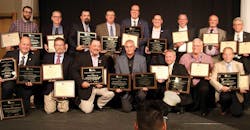NTTC hopes new campaign helps change social acceptance, state laws in same way MADD did with drunk driving
THE National Tank Truck Carriers (NTTC) and tank truck drivers already see the severity of the distracted driving epidemic.
Now they want the public to see the issue in the same way.
And here’s a good statistic for starters – texting’s almost 2½ times more dangerous than drunk driving, according to statistics gleaned from the National Highway Traffic Safety Administration (NHTSA).
“CMV drivers already face stiff fines and penalties, so what we need to do is get the rest of the motoring public out there following the same guidelines and requirements we do,” said Candi Coate, NTTC’s 2017-18 national chairwoman.
Coate opened the Zero Distractions Campaign discussion, featuring executive members of the NTTC’s safety and security council, with a wealth of stats that make putting down the cell phone while driving seem like common sense – but social acceptance is lagging.
The Zero Distractions campaign seeks to push it forward by encouraging NTTC members to spread the word.
“It’s common sense,” Coate said. “It’s (something) that we’d like to bring to your attention – and we hope you’ll agree to put forth the effort to reduce distractions for yourself and others on the road.”
The panel included Coate, K-Limited Carrier’s vice president of safety and regulatory compliance; 2018-19 national chairman Dave Edmondson, J&M Tank Lines’ vice-president of safety; western chairman Lance Hagler, Trimac Transportation’s North American director of safety and security; and eastern chairwoman Amy Kruntovski, Gorski Bulk Transport’s safety, quality and human resources manager.
Deadly distractions
The NHTSA stats shared included the total number of people killed by distracted drivers in 2016 – 3,450, or an average of nine per day. Nine percent of all crashes involved distracted drivers, and texting drivers were 23 times more likely to have an accident.
“Drunk drivers are 10 times more likely (to have an accident), making texting almost 2½ times more dangerous than driving while intoxicated, which is an incredible number,” Coate said.
Thus the campaign’s motto: When you drive distracted, we are all impacted.
NTTC leaders first presented the Zero Distractions campaign to the executive members during the winder board meeting in February, and quickly received the support needed to move forward. Now the goal is to roll it out nationwide.
As part of the push, NTTC is advocating the use of “Hang it up” bags for storing cell phones while on the road, a gentle reminder to hide phones and other electronic devices, keeping them “out of sight, out of mind.”
“It doesn’t have to be right there within reach,” Coate said. “If it’s within reach, it goes off and we automatically answer it. We’re all guilty of it. Get it out of your sight, and you’ve still got it available if you need it in an emergency – after you stop.”
Taking the pledge
The Zero Distractions kits handed out in June at the NTTC Safety & Security Council 2018 Annual Meeting in Reno, Nevada, also included a bumper sticker, pledge card and petition to outlaw texting while driving in all 50 states.
The pledge card includes promises to use the storage bag, store electronic devices in the bag until safely parked, keep eyes on the road at all times, and help others stay focused by not distracting them.
The petition seeks support from US legislators for uniform laws against distracted driving in every state, US territory and Washington DC, because while legislation exists in many jurisdictions, it’s not nationwide.
“We compare it to back in the day when they kicked off Mothers Against Drunk Driving, and how that took off,” Coate said. “It’s along those lines, and the numbers tell us that it’s worse than drunk driving.”
That’s why NTTC isn’t satisfied with the Zero Distraction kit – it created an entire website.
Zerodistractions.org boasts campaign background information, supporting research on the imminent dangers of distracted driving and its pervasiveness, and a host of resources, including other websites and a half-dozen videos that personalize the issues and its potentially devastating consequences.
“They’re great videos to show, not just at your companies, with your drivers and employees, but also at home and personally,” Kruntovski said.
The website includes a chart of current state cell phone use and texting laws, ready-made public presentations and a National Safety Council link to information about cell phone blocking technology.
“We’re giving you a menu, and so the opportunity you have is to use all the items on the menu in different ways as your company sees fit,” Hagler said.
Fueling change
Coate mentioned MADD as an example of the impact NTTC hopes their campaign has on changing people’s thinking – and on influencing the eventual enforcement of laws prohibiting distracted driving.
As for how much the laws should change, that remains open for debate, even among NTTC members.
But there’s no denying some type of change is needed, and now.
“You’re starting to see where a lot of states already have something on the books, but it doesn’t have any teeth in it,” Edmondson said. “So they’re starting to come back around and say OK, with distracted driving – where most of the time it’s like a seat belt offense, and it’s a secondary violation and they’ve got to pull you over for something else – they’re making it an offense that they can pull you over for and write you a ticket.
“With this campaign, if we partner with the state associations, CVSA (Commercial Vehicle Safety Alliance), our state law enforcement people – who we all probably have relationships with – we can get it there.
“We just need to be another voice in the forest.”
About the Author
Jason McDaniel
Jason McDaniel, based in the Houston TX area, has more than 20 years of experience as an award-winning journalist. He spent 15 writing and editing for daily newspapers, including the Houston Chronicle, and began covering the commercial vehicle industry in 2018. He was named editor of Bulk Transporter and Refrigerated Transporter magazines in July 2020.




